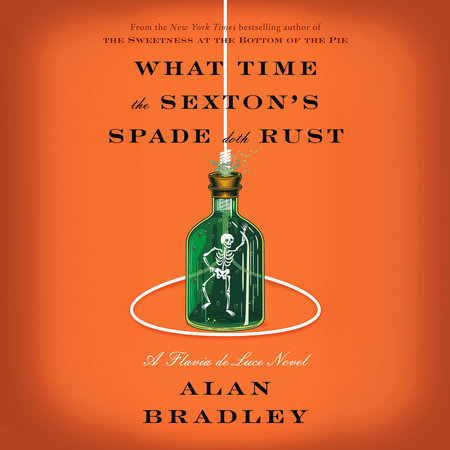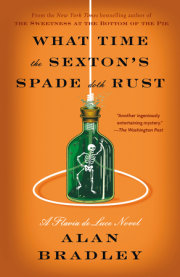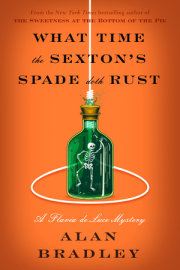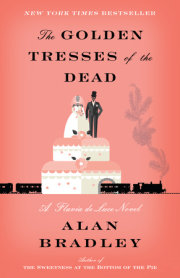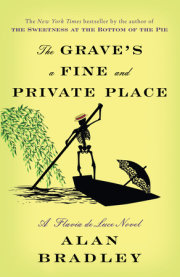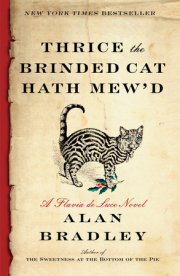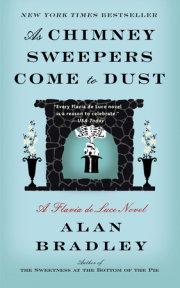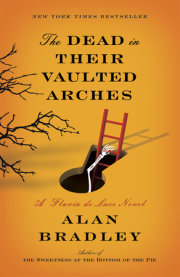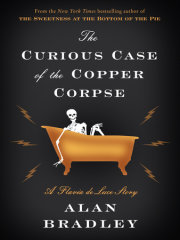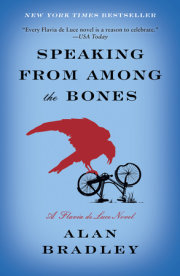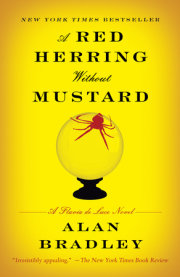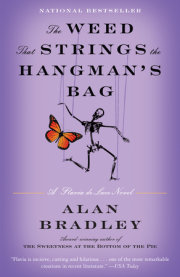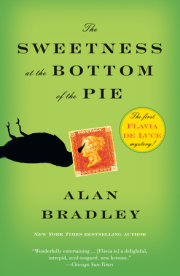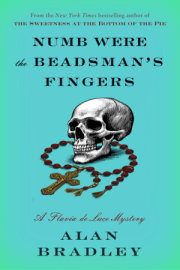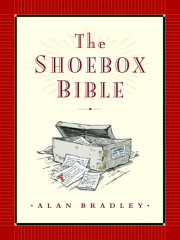One The greatest minds in the world are often cranky when they first awaken in the morning, and mine is no exception. If I am to ascend above the ordinary, I require solitude the way a balloon needs helium.
Which is why, barely a quarter of an hour after a hasty and solitary breakfast at Buckshaw, I am hunched under a black umbrella in the ancient churchyard of St. Tancred’s: the only place I can be certain of being left alone and in peace.
There is a particular kind of graveyard soil that bubbles when it rains. I have my own theory about the cause of this phenomenon but have come here for further study before committing my thoughts to paper.
In my experience, nothing is more deeply refreshing than to huddle under a bumbershoot in the rain and the raw fog of a country graveyard. Bare inches above your head, the downpour drums a military tattoo on the taut black silk as your nose greedily drinks in the invigorating pong of tombstones, wet grass, and ancient moss: a smell that opens doors in your mind you didn’t even know you had.
Churchyard moss is soft to sit on—but wet. Mrs. Mullet says I’ll get rheumatism and need to have my bones replaced.
It may sound cold and clammy, but there is a special warmth in knowing that you are utterly alone—except for the dead.
With the dead, there are no sudden rages; no fits of hissing savagery; no flung plates or cutlery; no petulant sulks or towering rages. Just beneath your feet the deceased are being devoured by fat black beetles, in a vast and grand banquet, while merry mushrooms digest the welcome leftovers of coffin wood. It is a world of harmony and dark contentment, a world of quiet grace and beauty. It is a happy dance of death.
I thought about the year I had sent up an armful of skyrockets from a remote corner of this same churchyard on All Souls’ Night, each labeled by hand with the name of one of the nearby but almost forgotten dead:
Blam! That was Nettie Savage (1792–1810).
Kaboosh! Samuel Pole (1715–1722).
Blassh! Arden Glassfield (1892–1914).
Boom! Poom! Poom! A triple salvo for Annie Starling, Spinster of this Parish (1744–1775).
Unfortunately, one of Annie’s fuses had come down in the gutters of the church, igniting a stupid cluster of accumulated moss and debris and thus setting on fire the House of God. The Bishop’s Lacey Fire Brigade had to be called to extinguish the small but fierce blaze. Father had expressed his displeasure by requiring me to make a monthly donation to the Fireman’s Fund, which, since it was ultimately his money, was no hardship at all. The tough thing was that I had to deliver each donation in person, which at first was excruciating and made me feel like a worm, but in the end I got to know a lot of firemen and learn the chemistry of quenching blazes.
Oh, those days of glory! And oh, to have them back again!
These days, my only friends are fungi.
Sometimes, when I can’t sleep, I pretend that I myself am a fungus, creeping silently and unobserved along some slimy moonlit surface, greedily feeding on unsuspecting bits of bark, smacking my fungus lips as only a fungus can smack them.
Smack! A nice bit of pine needle.
Smack! A taste of bitter willow.
Smack! An unexpected splinter of coffin lid, with its faint bouquet of formaldehyde. Encouraged, I move on, hoping for something more meaty.
And so on and so forth . . . until I fall into a gray and groggy sleep.
Which brings us back to St. Tancred’s churchyard in the rain.
I needed time alone.
“Flavia!”
Oh, jellied curses! It was Undine, my pestilent little cousin: the Bane of Buckshaw. How had she found me? I had tucked my trusty bicycle, Gladys, away in the church porch, both to keep her dry (Gladys loves running in the rain, but hates standing in it) and to keep her from unwelcome eyes.
I squatted even more deeply, scrunching my body slowly, as much as I was able, as if doing so would make me smaller, or maybe even invisible. Perhaps the pest would mistake my wet umbrella for part of a black marble tomb.
“Flavia!”
I held my breath and gritted my teeth. In her mackintosh and waterproof hat, she looked like an apprentice ghoul.
But she had spotted me.
“What is it, oh precious one?” I finally managed, brushing a raindrop from my eyelid.
She was looking at me, mouth agape, as if I had just climbed down from the sky on a golden rope.
“Why do you insist on following me everywhere?” I asked.
“ ’Cause I’m your crocodile,” she hissed, snapping her jaws and making a ghastly clicking noise with her throat. “Tick-tock. Tick-tock.”
“Kiss my crumpet,” I said.
“You’re nuts,” she said. “Do you know that? You’re nuts.”
My gorge, as they say, was rising. I bit my tongue.
“I want us—you and I—to take an oath, right here and now,” I told her, “on the sacred tomb of Saint Tancred, so to speak, to be kinder and more gentle with each other. We’re both orphans, remember, and orphans ought to stick together. Do you know what I mean?”
“Yowza!” she said enthusiastically.
“Don’t say ‘yowza,’ ” I said. “It makes you sound like a ventriloquist’s dummy. You’re spending too much time with Carl Pendracka.”
Carl was one of my sister Ophelia’s former suitors: an American serviceman from St. Louis, Missouri, by way of Cincinnati, Ohio. Carl’s childhood had been, in his own words “seasonally migratory.” Although Carl’s ardor had been dampened somewhat by Feely’s marrying one of his rivals, he nevertheless had taken to hanging round Buckshaw again after the wedding, perhaps, as my other sister, Daffy, suggested: “in search of smaller game.”
“Carl is a swell guy,” Undine said. “He’s teaching me to fart ‘Hail to the Chief.’ ”
“Undine! Don’t be coarse.”
“I wanted him to teach me ‘Rule Britannia’ but Carl said that’s a concert piece, and too risky for a beginner. You have to work up to it, like the Triple Splutterblast. So far, I’ve only mastered the Baby Duck. Carl says I need to learn to release the contralto and avoid squizzlers. So, I come here to practice sometimes. In case of an accident, you know. Say, Flavia, here’s a riddle for you: What’s white, has a handle, and flies?”
“I don’t know, and I don’t want to know,” I said.
“A chamber pot!” she shouted, doubling over with laughter and slapping her knee.
“You’re disgusting,” I said, trying not to smile. I didn’t want to encourage her.
“I’m not disgusting. I’m enterprising. Do you know that a Frenchman named Joseph Pujol became filthy rich breaking wind onstage in front of enormous audiences? And not just musical selections—he could also do animal impressions!”
“I don’t want to hear it.”
“Carl says I should begin by increasing my cabbage intake—plus plenty of beans. Carl says that will have even the angels begging for mercy.”
“I’m not interested.”
“You’re a prude.”
“I’m not a prude. I’m a decent human being.”
Undine squinted one eye and sized me up as if I were for sale in an oriental market.
“You’re a Buckshaw de Luce. You’re all the same. Hoity-toity. Nothing but starch and sauce. Lahde-dah. Sniff my hem. Ibu used to poke fun at you lot, you know.”
Ibu was the name she called her late mother, Lena, who had come to a horrible and spectacular end in a shower of stained-glass shards, some of them dating to the thirteenth century.
Copyright © 2024 by Alan Bradley. All rights reserved. No part of this excerpt may be reproduced or reprinted without permission in writing from the publisher.

